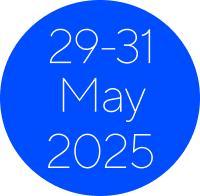Clinical seminar: Effectiveness of aquatic physiotherapy: case studies, interventions, clinical reasoning and outcomes across the world (CS-06)
Chair: César Sá (Portugal)
Speakers: Sophie Heywood (Australia), Konstantinos Chandolias (Greece), Yasser Salem (United States)
Learning objectives
- Understand effective, evidence-based aquatic physiotherapy including the clinical outcomes and benefits of aquatic physiotherapy in treating orthopaedic, sports, neurological, and rheumatologic conditions across different age groups, including paediatric, adult, and older adults.
- Identify Key Intervention Strategies: Attendees will gain insights into specific intervention strategies and techniques used in aquatic physiotherapy for various conditions, such as post-surgical rehabilitation, chronic pain management, and function and mobility, and how these strategies differ from land-based treatments.
- Apply Knowledge to Diverse Patient Populations: Participants will be equipped to apply evidence-based aquatic physiotherapy practices to diverse patient populations, enhancing their therapeutic approaches and improving patient outcomes in their clinical practice.
Session outline
The session will involve comprehensive coverage of the effectiveness of aquatic physiotherapy in a range of conditions including orthopaedic and sports rehabilitation, neurological, and rheumatologic conditions, tailored to paediatric, adult, and older adults. It will provide valuable insights and practical knowledge for physiotherapy practitioners with three physiotherapists with extensive clinical aquatic experience and skills in this area. The seminar will outline the opportunities that are unique to the aquatic environment. including freedom of movement, supported body weight, increased independence, increased confidence with movement, reduced fear of falling, physiological and other benefits. The seminar will outline how to designing a aquatic physiotherapy treatment program including how to link it to land-based function. The seminar will provide examples of evidence-based aquatic physiotherapy through the case studies.
Structure of the IOAPT Clinical Seminar:
- Introduction (5 minutes) – Welcome and overview of seminar objectives. Brief introduction to aquatic physiotherapy and its benefits. Introduction of speakers.
- Speaker 1: Orthopaedics and Sports Rehabilitation (15 minutes) – Case studies: orthopedic conditions, sports injuries. Key intervention strategies and clinical outcomes. Comparison with land-based rehabilitation.Brief Q&A session (2-3 minutes).
- Speaker 2: Neurological Conditions (15 minutes) –Focus on Paediatric and Older Adult Populations. Case studies: Stroke, cerebral palsy. Adaptive techniques for different age groups. Observed outcomes and impacts on quality of life. Brief Q&A session (2-3 minutes).
- Speaker 3: Rheumatologic Conditions (15 minutes) –Focus on Adult and Elderly Populations. Case studies: Osteoarthritis, rheumatoid arthritis. Specific aquatic exercises for pain relief and mobility improvement. Clinical outcomes and patient feedback. Brief Q&A session (2-3 minutes).
- Conclusion and Future Directions (10 minutes) – Summary of key takeaways from each speaker. Discussion on global applicability and relevance. Final Q&A and closing remarks.
Session delivered by: International Organisation of Aquatic Physiotherapists
References
1. Orthopaedic and Sports Rehabilitation:
Bartels, E. M., Juhl, C. B., Christensen, R., Hagen, K. B., Danneskiold-Samsøe, B., Dagfinrud, H., & Lund, H. (2016). Aquatic exercise for the treatment of knee and hip osteoarthritis. The Cochrane database of systematic reviews, 3(3), CD005523. https://doi.org/10.1002/14651858.CD005523.pub3
Marcia R. Franco, Priscilla K. Morelhão, Augusto de Carvalho, Rafael Z. Pinto. (2027). Aquatic Exercise for the Treatment of Hip and Knee Osteoarthritis, Physical Therapy, Volume 97, Issue 7, Pages 693–697, https://doi.org/10.1093/ptj/pzx043
Heywood, S. E., Mentiplay, B. F., Rahmann, A. E., McClelland, J. A., Geigle, P. R., Bower, K. J., & Clark, R. A. (2022). The Effectiveness of Aquatic Plyometric Training in Improving Strength, Jumping, and Sprinting: A Systematic Review. Journal of sport rehabilitation, 31(1), 85–98. https://doi.org/10.1123/jsr.2020-0432
2. Neurological Conditions:
Veldema, J. and Jansen, P. (2021), Aquatic therapy in stroke rehabilitation: systematic review and meta-analysis. Acta Neurol Scand, 143: 221-241. https://doi.org/10.1111/ane.13371
J. Siega, T. Christinelli, G. Leveck, A. Silva, V. Israel. (2024). Aquatic Physical Therapy: Effects on Functional Mobility in people with Parkinson’s Disease [abstract]. Mov Disord. 2022; 37 (suppl 2).
A. Amedoro, A. Berardi, A. Conte, E. Pelosin, D. Valente, G. Maggi, M. Tofani, G. Galeoto. (2020). The effect of aquatic physical therapy on patients with multiple sclerosis: A systematic review and meta-analysis. Multiple Sclerosis and Related Disorders, Volume 41. https://doi.org/10.1016/j.msard.2020.102022
3. Rheumatologic Conditions:
Al-Qubaeissy, K. Y., Fatoye, F. A., Goodwin, P. C., & Yohannes, A. M. (2013). The effectiveness of hydrotherapy in the management of rheumatoid arthritis: a systematic review. Musculoskeletal care, 11(1), 3–18. https://doi.org/10.1002/msc.1028
Siqueira, U. S., Orsini Valente, L. G., de Mello, M. T., Szejnfeld, V. L., & Pinheiro, M. M. (2017). Effectiveness of Aquatic Exercises in Women With Rheumatoid Arthritis: A Randomized, Controlled, 16-Week Intervention-The HydRA Trial. American journal of physical medicine & rehabilitation, 96(3), 167–175. https://doi.org/10.1097/PHM.0000000000000564
Ma, J., Chen, X., Xin, J. et al. (2022). Overall treatment effects of aquatic physical therapy in knee osteoarthritis: a systematic review and meta-analysis. J Orthop Surg Res 17, 190. https://doi.org/10.1186/s13018-022-03069-6
View all clinical seminars
See the 11 clinical seminars to be presented at congress.
View all speakers
Find out who the key speakers at congress will be.
Registration
View the registration fees and register for congress.




